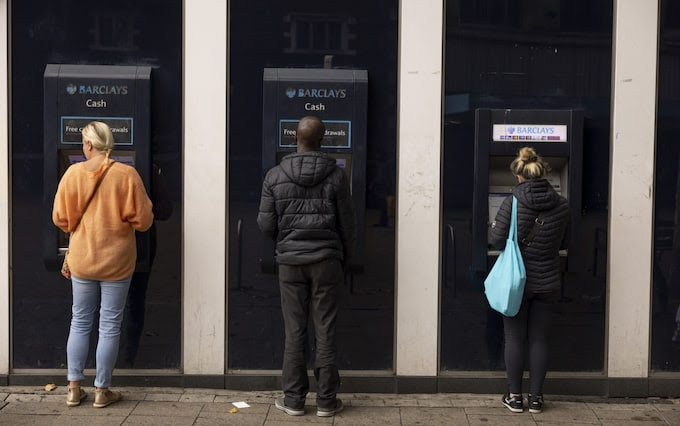The right to access cash will soon be enshrined in law
A new bill to remove no cash “not spots” will provide protection and reassurance for communities across the UK

Credit: Jason Alden/Bloomberg
One of the macro trends we are likely to see continue in 2023 is the continued switch away from cash to electronic payments. Over the last decade or so, the use of cash to pay for goods and services has declined by almost three quarters. The industry body, UK Finance, report that 85% of all payments are now made electronically. It’s not just the young: around eight out of 10 people of retirement age are using contactless card technology at least once a month.
However, as Telegraph readers regularly and rightly point out, for now cash is a necessity that millions couldn’t live without, and a backup for us all if online systems fail. Just as with Covid and the higher cost of energy due to Putin’s invasion of Ukraine, protecting the vulnerable is at the core of this government’s values. We will not leave behind rural communities, the elderly or those who use cash to manage their personal finances as the UK undergoes this transition.
That is why, for the first time since the ancient Celts began minting their own coins in the British Isles, 2023 will see communities benefit from a regulated right of access to cash, enshrined in law via the Financial Services and Markets Bill currently going through Parliament. It will cover not just withdrawals but also the ability to make cash deposits, something that is particularly important to small businesses. Putting this in statute is a huge step forward.
Working with industry and regulators, we will ensure that there are no cash “not spots” where consumers have no choice but to travel large distances or to pay high fees to access their own money. “Levelling up” in this context means that the fees that cash machine operators receive will see operators in harder to reach communities receive relatively more. And with 40,000 free-at-the-point-of-use cash machines across the UK, in most places, it is often easier to withdraw your cash than it is to find a local pub to spend it in. In fact, partly as the result of successful industry initiatives co-ordinated by the Link network, there are almost as many free to use cash machines today as there were in 2010 meaning that 95 per cent of the population live within 2,000 metres of at least one. That is in addition to the widespread ability to get cashback when making purchases.
For consumers, electronic payments can be more convenient, leave users less vulnerable to street crime and provide an instant transaction record for protection purposes. No more fumbling with coins or having to have the exact change for a parking meter. Contactless “tap and go” technology has liberated a new generation of entrepreneurs. I saw this myself when visiting pre-Christmas markets in my rural West Sussex constituency, having previously also been able to donate to this year’s Royal British Legion charity appeal with a simple tap at a contactless-equipped poppy seller.
There are respectable arguments for the anonymity of cash as an ultimate backstop protection from an overmighty state, but we should not be naïve about the extent to which cash also facilitates a “shadow economy”. Although hard to quantify, some estimates put this at around 10% of UK GDP. Better collection of taxes here could mean a greater ability to cut taxes elsewhere. The ability to work “cash in hand” has been cited as one pull factor for migrants leaving safe countries on mainland Europe to illegally cross The English Channel.
Faced with this rapid change to something as fundamental as how we pay for our everyday goods and services, I believe that we have found the right balance. Protection and reassurance where required whilst not impeding the innovation that we need to allow our economy to be competitive and support its all-important growth.
The author is solely responsible for the article and his or her opinion.



